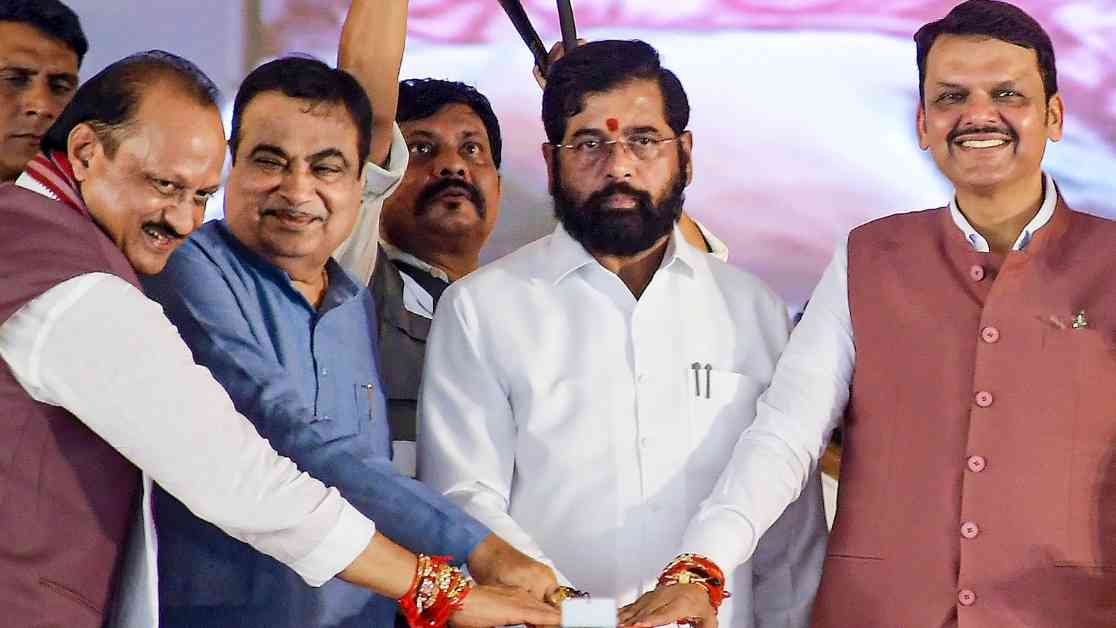The Maharashtra state assembly elections are heating up as the Mahayuti alliance, consisting of the Bharatiya Janata Party (BJP), Shiv Sena led by Eknath Shinde, and Nationalist Congress Party (NCP) led by Ajit Pawar, negotiates seat-sharing for the upcoming election. The distribution of seats among the alliance members has been a point of contention, with reports suggesting that the BJP may contest around 140 to 150 seats, Shiv Sena 80 seats, and NCP 55 seats. This leaves only three seats for smaller allies within the coalition.
Negotiations have been ongoing, with Union Home Minister Amit Shah meeting with top leaders from all three parties to address the seat-sharing issue. Shah has assured each party a respectable number of seats in the upcoming election and urged them to avoid public confrontations and present a united front. However, tensions have risen as the BJP is reportedly pushing for a larger share of seats, potentially leaving only 128 to 138 seats for the Shiv Sena and NCP combined, a scenario deemed unacceptable by the latter two parties.
The Mahayuti alliance is gearing up to face off against the Maha Vikas Aghadi, an opposition coalition comprising the Congress, Shiv Sena led by Uddhav Thackeray, and Sharad Pawar’s faction of the NCP. In the previous Lok Sabha elections, the Maha Vikas Aghadi secured 30 out of 48 seats in Maharashtra, outperforming the Mahayuti alliance, which won 17 seats.
The history of the Maharashtra elections is marked by political upheavals and realignments. In the 2019 elections, the BJP and Shiv Sena achieved a decisive victory but later split over a leadership dispute. Uddhav Thackeray formed a government with the Congress and NCP, only to face a rebellion from Eknath Shinde in 2022, leading to the fall of the government and Shinde forming an alliance with the BJP.
As the seat-sharing negotiations continue, the BJP insiders have indicated their intention to contest around 160 seats, with approximately 60 seats allocated to Ajit Pawar’s NCP and 70 seats to the Shiv Sena under the leadership of Eknath Shinde. A senior BJP leader noted that in the 2019 assembly elections, the party fought around 160 seats and won 105, indicating the need to contest a similar number of seats to secure a majority in the upcoming election.
The seat-sharing discussions have emphasized the need for a respectful distribution of seats among the alliance partners. Amit Shah has personally intervened to ensure a fair allocation and address any conflicts that may arise during the negotiation process. Sunil Tatkare, the state president of the NCP, confirmed that Amit Shah had assured personal intervention whenever necessary to resolve any issues that may arise.
Meetings between Amit Shah and the top leaders of the ruling parties have played a crucial role in addressing key issues such as schemes, allocation of funds, pending approvals, and conflicts within the alliance. In a meeting at Mumbai Airport, Amit Shah, Eknath Shinde, Devendra Fadnavis, and Ajit Pawar discussed the allocation of funds for various schemes and addressed pending issues related to approvals and funds from the Centre. Another meeting focused on internal conflicts and seat-sharing arrangements, with Amit Shah expressing displeasure at public attacks by Shiv Sena ministers on the NCP.
The ongoing negotiations and discussions between the alliance partners and the intervention of Amit Shah highlight the complexities of coalition politics in Maharashtra. As the election approaches, the Mahayuti alliance aims to present a united front against the opposition coalition, Maha Vikas Aghadi, in a bid to secure a majority in the state assembly.
Challenges in Seat-Sharing Negotiations
The seat-sharing negotiations within the Mahayuti alliance have posed significant challenges for the parties involved. The BJP’s insistence on contesting a larger number of seats has created tension within the coalition, with the Shiv Sena and NCP expressing concerns over the potential imbalance in seat distribution. The delicate balance of power among the alliance partners has led to intense discussions and negotiations to reach a consensus on the allocation of seats.
The BJP’s strategy of contesting a higher number of seats reflects its ambition to secure a majority in the assembly and maintain its dominant position in Maharashtra politics. However, this approach has raised objections from the Shiv Sena and NCP, who are seeking a more equitable distribution of seats to ensure a fair representation of their respective parties in the upcoming election.
Impact of Previous Elections
The fallout from the 2019 Maharashtra elections, which saw the BJP and Shiv Sena part ways after a decisive victory, continues to reverberate in the state’s political landscape. The subsequent realignment of alliances and formation of new partnerships have reshaped the dynamics of Maharashtra politics, leading to shifting allegiances and power struggles among the key political players.
The emergence of the Maha Vikas Aghadi as a formidable opposition coalition in the state has posed a significant challenge to the Mahayuti alliance, forcing them to navigate complex political terrain and forge stronger alliances to consolidate their electoral prospects. The performance of the Maha Vikas Aghadi in the Lok Sabha elections has added to the pressure on the Mahayuti alliance to present a united front and strategize effectively to secure a majority in the upcoming assembly election.
Future Prospects and Challenges
As the seat-sharing negotiations continue and the election date draws closer, the Mahayuti alliance faces a critical juncture in Maharashtra politics. The outcome of the negotiations will determine the strength and cohesion of the alliance, as well as its ability to withstand the challenges posed by the opposition coalition.
The leadership of the alliance partners will play a crucial role in navigating the complexities of coalition politics and addressing the concerns of their respective parties. Amit Shah’s intervention and commitment to resolving conflicts and ensuring a fair distribution of seats underscore the importance of cohesive leadership and strategic decision-making in the run-up to the election.
The Mahayuti alliance must prioritize unity and cooperation among its members to present a strong and cohesive front against the opposition coalition. The successful resolution of seat-sharing issues and the ability to address internal conflicts will be crucial in determining the alliance’s electoral prospects and its chances of securing a majority in the Maharashtra assembly.
In conclusion, the Maharashtra state assembly elections are set to be a high-stakes political battleground, with the Mahayuti alliance and the Maha Vikas Aghadi vying for supremacy in the state. The seat-sharing negotiations within the Mahayuti alliance will test the strength and resilience of the coalition, while the leadership and strategic decisions of the alliance partners will shape the outcome of the election. As the political drama unfolds in Maharashtra, all eyes will be on the alliances, strategies, and alliances as they vie for power in the state assembly.




















